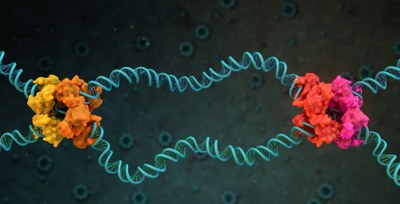Medical Systems Biology
The Buchholz group conducts research in the fields of functional genomics and genome editing. We aim to identify, functionally characterize and repair disease-relevant genes using various genetic tools (such as RNAi, CRISPR/Cas and Designer-Recombinases).
Genome sequencing has shown that cancer mutations are patient-specific. Therefore, each cancer genome has its individual genetic fingerprint. The Buchholz laboratory develops technologies to discover, study and eliminate cancer-driving mutations, thus improving individual cancer therapies as well as advancing the current options for personalized medicine. Massive parallel sequencing has provided the means to rapidly identify all mutations that are present in a tumor. Nevertheless, it is frequently not known, which of these mutations are actually driving the disease. Genomic tools, such as RNA interference have enabled the comprehensive analyses of cancer genomes allowing genome-wide loss-of-function studies in a wide spectrum of organism. Hence, it is now feasible to probe the function of each gene in cells by genome-wide RNAi screens. In addition, CRISPR/Cas9 is one of the most revolutionary tools in biotechnology.
Our laboratory has developed this technology to specifically cleave DNA at sites that are mutated in cancer cells. In addition, we are performing large-scale CRISPR screens in primary patient material, e.g. cancer cell lines and established cancer organoids, to functionally dissect cancer mutations. Another focus of the laboratory is the development of genome editing tools for precision genome surgery. By applying state of the art technologies, Designer-Recombinases and other genome editing tools with therapeutic potential are developed and tested in vitro as well as in vivo.

Methodology
- Site-specific recombination
- Directed molecular evolution
- CRISPR/Cas9 technology
- Long read PacBio sequencing
- Nanopore sequencing
- Large scale RNAi/CRISPR screens
- BAC-tagging
- Live cell microscopy
- Organoid culture
- Deep-Learning/KI
Contact
Prof. Dr. Frank Buchholz
Group Leader Medical Systems Biology
Faculty of Medicine Carl Gustav Carus, TU Dresden
Phone: +49(0)351/463-40277
Email: frank.buchholz@tu-dresden.de
Wang P, Sen R, Buchholz F, Sayed S
A base editing platform for the correction of cancer driver mutations unmasks conserved p53 transcription programs.
Genome Biol 26, 217 (2025). https://doi.org/10.1186/s13059-025-03667-7. (2025)
Mukhametzyanova L, Schmitt LT, Torres-Rivera J, Rojo-Romanos T, Lansing F, Paszkowski-Rogacz M, Hollak H, Brux M, Augsburg M, Schneider PM, Buchholz F
Activation of recombinases at specific DNA loci by zinc-finger domain insertions.
Nature Biotechnology. 2024 Jan 31. doi: 10.1038/s41587-023-02121-y. (2024)
Rojo-Romanos T, Karpinski J, Millen S, Beschorner N, Simon F, Paszkowski-Rogacz M, Lansing F, Schneider PM, Sonntag J, Hauber J, Thoma-Kress AK, Buchholz F
Precise excision of HTLV-1 provirus with a designer-recombinase.
Mol Ther. 2023 Jul 5;31(7):2266-2285. doi: 10.1016/j.ymthe.2023.03.014. Epub 2023 Mar 17. PMID: 36934299; PMCID: PMC10362392. (2023)
Sayed S, Sidorova OA, Hennig A, Augsburg M, Cortes Vesga CP, Abohawya M, Schmitt LT, Sürün D, Stange DE, Mircetic J, Buchholz F
Efficient correction of oncogenic KRAS and TP53 mutations through CRISPR base editing.
Cancer Res. 2022 Jul 8;can.21.2519. doi: 10.1158/0008-5472.CAN-21-2519. (2022)
Hoersten J, Ruiz-Gómez G, Lansing F, Rojo-Romanos T, Schmitt LT, Sonntag J, Pisabarro MT, Buchholz F
Pairing of single mutations yields obligate Cre-type site-specific recombinases.
Nucleic Acids Res. 2021 Dec 24:gkab1240. doi: 10.1093/nar/gkab1240. PMID: 34951450. (2021)
Sreevalsan S, Döring M, Paszkowski-Rogacz M, Brux M, Blanck C, Meyer M, Momburg F, Buchholz F, Theis M
MLLT6 maintains PD-L1 expression and mediates tumor immune resistance.
EMBO Rep. 2020 Oct 15:e50155. doi: 10.15252/embr.202050155. (2020)
Sürün D, Schneider A, Mircetic J, Neumann K, Lansing F, Paszkowski-Rogacz M, Hänchen V, Lee-Kirsc, MA, Buchholz F
Efficient Generation and Correction of Mutations in Human iPS Cells Utilizing mRNAs of CRISPR Base Editors and Prime Editors.
Genes (Basel)May 6;11(5):511. doi: 10.3390/genes11050511. (2020)
Sayed S, Paszkowski-Rogacz M, Schmitt LT and Buchholz F
CRISPR/Cas9 as a tool to dissect cancer mutations.
Methods 164-165: 36-48. (2019)
Camgoz A, Paszkowski-Rogacz M, Satpathy S, Wermke M, Hamann MV, von Bonin M, Choudhary C, Knapp S and Buchholz F.
STK3 is a therapeutic target for a subset of acute myeloid leukemias.
Oncotarget, 9(39), 25458-25473. doi:10.18632/oncotarget.25238 (2018)
Mircetic J, Dietrich A, Paszkowski-Rogacz M, Krause M and Buchholz F
Development of a genetic sensor that eliminates p53 deficient cells.
Nat Commun, 8(1), 1463. doi:10.1038/s41467-017-01688-w (2017)
Gebler C, Lohoff T, Paszkowski-Rogacz M, Mircetic J, Chakraborty D, Camgoz A, Hamann MV, Theis M, Thiede C and Buchholz F
Inactivation of Cancer Mutations Utilizing CRISPR/Cas9.
J Natl Cancer Inst, 109(1). doi:10.1093/jnci/djw183 (2016)


